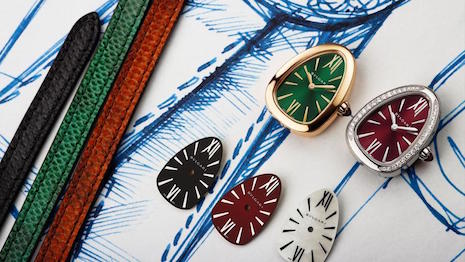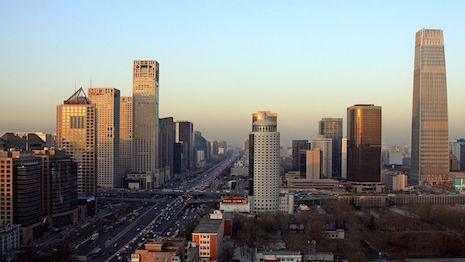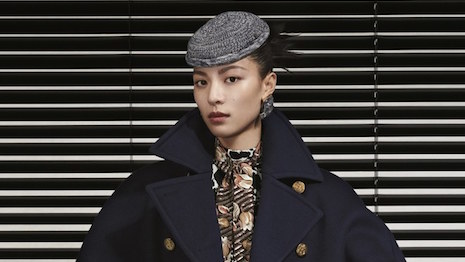With China's economic growth rate slowing to a record low, the number of Chinese ultra-affluents who are "very confident" in the economy dropped more than 10 percent in 2018.
While one-third of respondents in Hurun Research Institute's "Hurun Chinese Luxury Consumer Survey 2019" still have great confidence in the economy, it represents the lowest percentage in the report's history. Over the next three years, high-net-worth Chinese will focus on real estate and overseas investments.
"It is expected that this year's luxury consumption will be more conservative, but there are still a certain number of customers with wealth accumulation," said Rupert Hoogewerf, chairman and chief researcher of Hurun Report.
Confidence dwindles
Most of China's ultra-wealthy accumulated their fortunes through investments and have a healthy appetite for luxury goods.
French fashion label Louis Vuitton remains the second most popular brand among both Chinese men and women. Technology giant Apple is the most favored brand among Chinese men, while women most prefer gifts from jeweler Bulgari.

Most affluent Chinese women want gifts from Bulgari. Image credit: Bulgari
Among wealthy Chinese men, electronic products have surpassed watches as the most desirable gifts. Cosmetics saw a boost of 5.3 percent among Chinese women, while gifts of jewelry saw a drop of 9.2 percent.
Regarding the economy, 14 percent of respondents have "no confidence," an increase of 8 percent from 2017. The number of "very confident" luxury consumers fell 12 percent to 34 percent.
Fifty-two percent, however, remain confident about the economy and are taking a "wait-and-see" approach. Thirty-six percent of Chinese HNWI are also looking to avoid risk when considering future investments.
Almost four in 10 respondents are considering immigration, with Europe as the most popular destination. Australia and the United States tied for the second-most desired location, although this represents a drop of 13 percent for the U.S.

Wealthy Chinese remain interested in real estate investments. Image credit: Knight Frank
A quarter of those surveyed are planning on investing in residential real estate. Interest in overseas investments declined to 12 percent.
HNWI strongly consider cost-effectiveness key for overseas property purchasing. China itself is poised to be a vital market for real estate now that the country is home to the fastest-growing prices in the world (see story).
Closer look
Ultra-wealthy Chinese are also embracing tourism as a form of entertainment.
Travel expenses accounted for half of household spending among Chinese HNWI, according to Hurun. Respondents ranked Japan and France as the most attractive international destinations.
As travel spend by Chinese consumers continues to reach new highs, hospitality brands must be responsive towards changing attitudes and preferences among this valuable audience.
According to a report from Resonance Consultancy, Chinese travelers will account for a quarter of all international tourists within the next 10 years. Destinations need to capitalize on this opportunity by showcasing what makes each location unique and embracing technology (see story).
Looking to the new year, however, signs of a slowdown in Chinese spending are causing a slump in luxury stock prices.
Despite the popularity of Apple among Chinese affluents, the company announced that its $84 billion in revenues for the quarter ending Dec. 31 would fall short of the company’s projections of up to $93 billion. Since CEO Tim Cook specifically mentioned slumping sales of its high-priced smartphones in China, many investors are worried that sales of luxury goods may further slip amid other economic tensions (see story).
The Savigny Luxury Index, which measures the share performance of 18 of the largest luxury companies including conglomerates LVMH, Richemont and Kering, declined 1 percent during December. Investors seem apprehensive as geopolitical and economic uncertainties continue to loom over the luxury business (see story).
"After the material age, high-end consumer consumption upgrades, they are not as arrogant as before, such as buying bags, watches, cars to show success, but more willing to spend money on spiritual luxury, such as tourism, education and health," Mr. Hoogewerf said.
{"ct":"OY2aexEiwyzOZTzr\/KOA3s5ryp4Vs9b6RZX82fq3Ls9A6SsZUdQwuMpQqPeQyPsuRGUzcYuZIqxG8Za9+FaHGP1vC\/Srs44wbAKGNXd+k\/bwGnzwdgfH8Lu8tZzWEQUpQGAW0I89yH0M9k4t45zVf6uGGPvpxS6Kuinw35dR8qrUcdeEfzERP95AwIgpmA8a1DHJrTe8KqF8ICKVcqAtHLajI8OYZj9fxeD9XdWU3teBNTSTkscL+ajNt\/xFI1Z8aYzsK+zEQRPWt7AFkU7b8njgqZ4\/OAENfOp6uKCtApBdxXkrKZ83ZDSilhC6py+neAORE2iwaFIjKH29Z9Ev63hP+gFpL7ssNCcwJNdeUjBCWrt\/O5AN3dHkc2uczjM5vjZE2XrZ300XqB8YGENWIXERqch5SrrGM5C9NYfW9q4PuucrDDRyW\/6J2z+4oLes9mB\/hPsold0EaGtZPXrn9lmGqarGqaPjss7Qls82VmtkRp9H3qwOa9tdNi\/q2fPSsKm6E3i9Biu2EoygdRf22Abz0KfVJgGCykYQswXLxtpQLWSeEOcJymhJoDqMbBJp1UJ75TKnhKlEswutZzEA5IhuE8Dzis9qmE8ASMZEl4\/lZQpGByDjypKsyVy4LjJZoty4hqDjr\/hoJ\/WUbV8mESXJNOht6DS5WpvY\/lS7oxbuGZ\/yPOnvJsqQM2Cexj4UTqadZ593wXKYMWGLQmJ47yNZ0blU9jkDuITazRlDwO8pCpo1eSMEO2MCghCNELyCxWZzzClfUdd34ozN7raAhANQOAkEjUfRHAxaNLlyXA\/hJDm29aq9s3OnxUkc1j8feST86KG2vk910Ggzmy4OWiNQV82QcVaHkkZNdE33QbxFcyGbDxLxyB++xCaVxiaNvsFGkyTZqnpEYkgkZcpextziLrRka48fSa0vA7efXg+lm2DeF9ornUbcYcc4vGGIHmMTwDkEntQkaSyF\/wd87nmQrdPZHzouH\/DjTGk7JgYiInrnbyBf56SiyWFTV5Sfx8ILGkph\/09A\/vK+nsBz5WiIV28L4Jb0kBvL7Bg5E6hDt6TjtCBWwUHvRD9IrBHSdgKTtc+VddCpGUUqW32Asyt4YCsOn6qGmtaJvkR+p9TU0qugSKUeY9ZAXZ26LWjKm+NIDZX04iJ0OP5KI6g2imTt3p2IUwOdIyZ4yesWYtHcAZqYZiYmT9StTy8dtREIfj+zScseOoXtYE2erXcyZbAKOwuhHrgQ58PhKwg5mv3Sq2ZkuqzsOiC7HY1eeeoZ14jZEfKDOgvRAmhAi16iG4ieGGIWnTbM9TNZfVGy7TeNDNc1Kh+t0AKpXqVsjPpryIFXvHyoqcnf3mOU5t2ubVmJM5W1U3n1pSA2pUpjHoyRgwdOHtND8Hyef1KjkF0LbCubwb0vpT5vhwHlzAQ7yRFMPsvqlVR7Ay3U9\/GoR1Wg58Pf+gbwvp\/irw6VJ1y9iTzmAN8aFtYJjqWFRFvAUwEwE8itDMiJRq6vtkZr5icAwz3Dbx6xS8+Fl2yZJCJWc2BtdHq4Vv5N4mZzrS9sJFTp6Tm1sq06hKlUx4PbCOyWEvIZd4hJiZBl9Slk\/7rcbXmYD+AhhPI1k2yxBDTcINmsTHiZYSaesoOKZ05SWnHyRFUVhpHvC9sv4BRKS8FrgFjCO\/uXIaqIIfnKsL2MvMBtizLg4yEtR7aglCI19KqAnAhRRyXax1ZrczIJBr6fs573okvZupyh\/0DeDhmLUMZZGdm73yJ3JKvCPdL8sAJor3qcueSXqxRD9KLqx2PojHlLqQ3XqCRC+pwGVMUJlSzN3OyOyc8GgWuwJDpkh20fap6Jyr7E\/IKiFShen+YLam+jiLSb65z6Qxm5Me5qwQrCu9NoBb9puldvjS9JFADGkfS2azmQkOZ53ZNZS5kpULhldFDTvAZzR02dujMmcFIOaqBF7DWw0PAIKk0cgAtKdISSVoSdOSgSQ8hM1VQLTgQqg1PResz+G8LvNVCaRv1qA3bR+sPJznqPUFnoifIvK9eNl37X1yG\/36+IzPU\/n7VidCOh86NA2Xl6G90toHDiIRNnMhWsW9K+Qz9vH2c8gLOy8\/2oVWkmr7FG+FKgpMQpacF7M1xndEsYztsYTl\/kYtPKnOmE20hDQsljdw18\/qiAl1bnyXP+oxo6ll+0qweiI\/VC44yURvTI5CKzC9nbaeCs7511hkty\/2av5mWdcJrBvEexQX8LC7gWXt3XJojHFH9dxAgKLgTNS65gWo86UR8a5jI8QR2hVW96rtggdqfHv0enEpKGVpJ9Xn\/0r2C\/jvXssYPgQgvSRl9FHx6VYN8G7mn+NUONhhKyOjaNuwBzXYDELjf6moHuZmO6xxb3sQV927fSzRL5OI5K6z+4i1JMfCWZ1w8sbcDrKNWrhKskp622pHLVnWdpLMg106e1v+Znq7PDKn1fj6QOlm9YQQWy8EgP0bgJV3FzjlIb01VrL\/015ZTvt6j+9XzF8okv5uTm8yYcRE9mVLSqQygiOF9SkC\/V3xUxypzjNglrg1DY9Pac4NG0Dh0OmIURRuKsse46alxiJ5CV2XQGjV+YnkCNS417B1Svr6wtS6FHg\/\/Ol0dw+JSz2j6mbpUs8Kg3iz3iK7NGob69G5FIHHchMPeghss68\/+iLebk5+QAl3brDhBR5ZzoV1NUSUfi2JXM6Rgg1Cim1joDPMKiKmQaixI8z5JREaLLu\/VaUYLPau65EtmdaHfa0XerNqnH1YYQxzkp6sM5mmNwBRGvd1ELiCNP7d0zJmf+vhxVf7afw\/vx5d3XkChjV2yrChy3JRJUgaQXLRBYOckVxKxwbuKoTgkSROuffXLhI80AQ6LuWmpgXoKQvZRtl0HZHQqf+hHX6sZ+RIydVYuodex+rCT94brMboqcA0ALtfJipwiGz1P\/4Mdygq7HDQq1D0flqkGx63vjIE\/yWkHhonfNGNO2enuHHS3vJaxXNhtjRAZChczqxkStJwPeDVUli11lYpSoEKNMDGcI0vL9qYcH7egXuv+c1IiCp1YCBWePk9m1WF7JXqeQo2VN5oOplL6OZz2KIYT4TGBNlx1mtEiop4lWrsV0Jzs\/IiCOfK7PdxpPjSebFDoZhERYniTvfTeLfTczJHUcAoLyWSqE+ouMpl+vexjJfdV6h9V1p9p\/nKJrm9rOf4AG\/ONaE1fdLJKJHc9BRPfg78RuoVxW\/eA19DVEtB5MtagcTyOkkQhPAHagetPQj0jckjqpyJeudl6uugYTnPe+mNfZhLF+J+AYMCv9itI94OscI2xs0KCniL72uqrqMhCr5Mcs4ylJ67ZaIpl2MBeXAOftKs4ipwYCr\/UdMTBzyhv\/3R\/haO6iw2HDe7+93YNNq0OpYCB5IkeyRXGlDXyj4s8oo+6sNiOTtcuhUpRPn1Sp7A5GXZmvHBBn5bVJ3jdyEUfaHxKflmfka1XM1jNOgpXShtac6Duhul8aX+EZEzu\/x\/j4\/2gJ9F3XbcSzCKF9zA0AItADGMSK3+8ll2hIQAKW3+NaVKBU6AFdjGka0HhnxsJBRUa0XJ3tsCOLXhNldz3mg3CBYTnr72zYo1+1LNre3N5Rx+0Ka4vwweSeUTYWEdvCYEqYUZfcy7IMWb5MvrJ2BOTHc4o9BQQrsE8ODkzHXjo1W+vLppj7n7PFMONhgt331IcBc5YvwY3YUZUrPyyx7iX4J2bqg+L4OgeU5CTRRSaSVWjpOGKepghEqgFrdSpquNeidzMttZR36Y4vkxEHzLLAzKqKLE8Xmh+eEoa\/hMW4syo4A04fLCClfZF7MlmoiE7X6zBw7mKMDIS2AUlWmBSpZ0+8ZRw0eQ3JOqGbJv8Do7BV46a06K9htKRnbNr2WJEl7e42\/BZLxKfJIu53khnNiPmrwh9hZW2qC1Yddp803KN1d+WcvAj5fkE72gWEkduolc48iPWA79O5W4fBJd24z3M0h1m8FDZ0UqDGPcGDOCP2jEYF3BB9fx+nGQ0Gyqf\/J1N\/QTcGm4r81G6nsCpvya2jGoJryZCVmK6XpaLAPqOBoUD8Ua6t5tJhgbcmRY8IKBgq0r5QVTk4MhUD1JdiArliMQAgZQjsjL807+zr1gPYLhxHNHHZGHkMDmybmuEiofce4LNfhkxWWTawxZntssFpxATNxMxlPHGQ+8oP4pYV1jybvbHtlEcH0Cp0qyxKXtWZ1h2PPmdx9gkSMCp2YIW5ZGZ+u+CmiegSXBQzznvEgL49NL7EmpV4tv\/+xADnQizxhqhCh0W48A229\/GpEHlPlrQyxOkc2HZCJaUhGTFKSai\/Qk1xOfwgF1zbkxsORl1wf8nkFSAVJm5TY5bXqW0qqeZbfhaAUXrk7wJgALlj9EDmhs2fPcWP4rdWDADZGAcATCiJqs6At\/YSHeRZIUnLV7Mpk6aoxfA8PqJIJKi89YcfQfQIUTAomv4Fax7Gd+YvOWjlkuX43CvK2wg936FE1msVyiw15iSkSjilEa8Y5K9+OQIYyTxGXLu+Y6KxpKxfgouHiPf9IlzyivDIKOwaaWAgg5KEqlthfzlQkkeN4o5nm9Q4ctO4jbryrOHV4WOh6H8qCfKRCnHMb7a\/qucHg64rYaOI6mPysoBlBHpSzceHG2hienc0PCKRw1RYoll+79bSKs09uFqfQVT0ihMn2JSvUJomKvC3qRmLcdx+fdUzQSAj+AA8kuBKSOgfEYJLtYW4UlPrc1r8p2iv6r\/NVgvnteZm1XKoGJnU2WttZCLjqjOy6vU2lzPIIrdNFKnpQsAx1dG49nVRy2xxEjKQaV7gF+9sOsh7hmzSLc8qL0Vs5Ii9ksw3G23Ir4DVp2JW9\/JZe8bpSK1m+aNxeih90c2CFR9mN7ENGro71drkcyfs0BhCfjo8+iBdE9Rv0idVWJohs0nkE7FUlkxlIYoYAe1hyJ+MkDm\/LkryaGkmxxQR0N3ONGDAb2wh8X3iOyFUd7pHPIFcmqXTEl9ji8ENesMeLehJBPqi2FBdPxrGPxajhWB76YccFfyqRe7acvRzPzCgizCh0iWZNmKd4RcAYooey7BxE3TJC8mxaM\/ApsNX74xjYloPZyXyfG8JfhtQOM3LTp5u7gQaMvlLQMKez2BIXsLnvmO3htJi4S7MSAo1Mpq3AJjOD+GgQlFAzY3ujg99WxEuCdKfcKkCdG388GBTKyhBqdh7b\/GYM93y56x8NkHR4bIAqU\/zYRk4lrLHjdzmBHt7g+EGxD2Z0yTTfOQc90EyvcmzQJT9eC2qfVi5mCDpNgaMZu3V0LlgSSVl48BdBRP8CpN+sEPwbCh\/YGMkp5ZT5efparYWWKKfTS+0P6GU0o4WuubUgSZEamHjXzfCU90YrSBm\/OACEDUm6HmX8pYfRj7HOMNL7ZLgm5WNytiw8ztO1ZAOmD+EnTsblSWd139d7cJHVXnBkK9vsBOgvLZHrsD4jSCGQvNianBBzTY1INLp4TyNzFGWDFMH4bwwetVE8519pi69bvdx3zYGO863lt8HNgm8hri3pppLI2WpO3ub0JIopreSwFf8977STbuVDbOmLfza\/H+zIu\/rTzFJTDdm4L4DCE+5y56yg7fWlQg25DPaIJYdOwvwHWoB3MLJCeGfaO4\/x7zC3pu0ZJ2GENqbr0lWU+RHMS9cYZ\/3\/4S39xIOc\/MDmbtnYkIxeLm+ibw0v8VXdJxInyK+mCnoLD4jDs\/lNQ\/TWoSeyQW09jWzbmIqDEBmKxzX3ITVzAddyb8+kjFXw3reVc0PC4Z+jjPHMNd62R9VBd9YRdSSeUGWzdktPWi556kUJYZV8o9Vza3SzLDvAFFoEU4VfMZYeBTcfE2LI2XW793CsYt13EY\/Lon7KQGKr3uGQS172bOVYpy4LW1kaQIL+a9ccbGKsP4f217cyve8Qhz1+G7qfjC+GTSZaN6LoHcV3KA1na8+5sBsq9R0l9oMqs\/IoRdmz3Evf2h86BmGYeGxpX1D2ESBeknOLpCxJbuOo33+1AQegFBsM8H\/T6ziwDWvqTUSovcU9AWSXMbLPniTX0mchE7Rl6jxtO\/0ev8LOeG1dAI8jMq4N6X1SZ9GDFzuc22Ye02qO8i8wqiqafFvygKHQFqpMcWZpKyPGFASSVanZxKGR5H2zF61B0Vx3DcSZT+lrwQun32aJB6ChKRPCMLWhNJ1OlQPS6PxdL1kGE8MyUIylWVfEZ9GkUUYDLS1\/M+JoekSDeTklxhB8k+7\/9KPSI1KkcJ7JUkPP\/nWMvhoYMb5B69MTUQkc7SsddV7Lf41nC\/iY05qZcaeJVX6t+HNoycXL9JAnqNmZcf7Vl0BdtuSaxOB2nEhOM1vQbiC2ZDQqUaAwIVzJZWw0eA46o9mEAle9dUKB21jFeIRu2yYrSr5WKsROhzwTTr250STkNqXl1Lq88uRFygAAHvBJkX1r9YZxA+zyFRmYi3YPYZnbO0PoOWWeHYhoR6iF+ncbM9FHjK+p5j60Jv0zk1nm1lJBWbLXmvKOhNBuUWn4lig+JZZoH9mOltOVEXhss5BvRj6RSIaTznO8eCBVbPHTmkSDZ\/B8SbnjGA38CHesA3z6k9jNxwyzedXiQpAGIzl\/Qs6CNEcvcr2ASnQjt9Ps1t2Sq88Y3\/fAr+9H43gQvMft9UWOF3+MGJrwprV0emjkcIcxxu1syPhqOgpdLQ+ug5A0GHVjuSOVDC+mhzJuhZ9VLNd5x\/MgvrBkRGmGlfZcCQlIsL0bTQ\/++CpfEnAyopE8cPa3ZJgox6p7pBmkNesrdV9ngVOXM7amsFprUujO7smvcW1SIRi01tU6woaYA7In1ySXSNcO4VZJaF645lRbAm9YeDDDJPgLy7anTdFygilPgzY2Dj37VH6KCtdm7PkKDI1VV+OK9761FZrXsJGclLa9Nhhj3DncvjkzqfnH\/8zxmEsMcN9A+5\/oUFp9KqBFo3vf+RwniTS8xKkR9zuEvzbL4jcTYnXo0XrPiuUk9Rp9BWQx94XlFAdcF\/ZhopelC2nFarQDQtqTpgxpNbniqXPGTmT+J4o5e58+PQfsjJmodZt8TL970uBOxnBQfGDEPmeGL3D4IVTZ8Yfl4hhCCHRfBlaJhnHxeIzfaLTH0jbKQ+OnNzGuU4ni9qB8xBDP6mLucAmNeI91neIqyVeHTiqXB89wg\/e3ufd+FJI4K+t9sMMA3xMZ5MTaP1uezNY7AJ\/laliJMnbOd0MBD7sxPBrZWRuqScung+hHDPzi48aKdKIiJy3WS2CzhDT3w0vHwSn+B6OGneoSz4XeEAaw70JVVTYZkfjHc9PO1\/W+HgnRP3N7hHscBzzaoAPWqcdgqQpR6lGiGpLprdYbeth6oqegBIH0++qWBlo3l740mRgxSm6P6IYgJS4TYBGikeH6afc0dqq4kfxqvymFGibsLsCk6JLHFo8hJtNn2zjGuAf5FVFNqKBgyw5SUNB8k9e3kbNO8ccZL\/uArbYRbFl0YYpYlrVz39K7os7PMv7ts+\/zHWLrVIVd0u+C9bmbcBnK5sfYUZjEPK8UxpqEBOLP8hzVsMzSKdJVatjajfhBgPNMPzLDQx+dWHuQeIOfrkNuIcjQVLyGOvfRr7ECTZX8TKI1zYjNzUcklNBAIQSSUpCSU9oD0JR1vvdpMLPV0WLcI32mVB85iUAhskhgRTlXMZqf2G2TX53a0fAWyXONQtilrmyjC3s4HUYdnqK2OztSNYNsXQcrT1JD+bFjWiHEcpGJfNzcKUfLeu4Fokc0wU2KBAZJV3MqDq2a1rs7L18JsaOgz3thkubJYCZdkP6GOsSvBUEyCEOKW1+fF0pK2j3\/VheyfWGb7aSjx8SNuYFC2eREazp2LSsHfqvZrlzWUgPEDzWTihqA4XZ","iv":"af02db989b71e1209c9b118a8c8747f6","s":"d7c92264a40b8024"}

 Chinese actress Zhong Chuxi is one of many celebrities to star in Louis Vuitton's look book. Image credit: Louis Vuitton
Chinese actress Zhong Chuxi is one of many celebrities to star in Louis Vuitton's look book. Image credit: Louis Vuitton